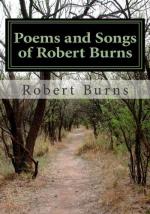|
This section contains 6,964 words (approx. 24 pages at 300 words per page) |

|
SOURCE: "The Early Period: Burns's Conscious Collecting of Folksongs," in Burns and Tradition, Macmillan Press, 1984, pp. 1–26, 147–50.
Here, Brown describes Burns as a transitional figure bridging the two spheres of oral and literate composition.
(That Bards are second-sighted is nae joke,
And ken the lingo of the sp'ritual folk;
Fays, Spunkies, Kelpies, a', they can explain them,
An ev'n the vera deils they brawly ken them.)
'The Brigs of Ayr, a Poem'
Robert Burns is remembered as much for his personality and character as for his poetry and songs. It is rather ironic that as an individual his roots in a peasant class are extolled, even emphasised; however, as a creative artist his debts to written, élite precedents are principally cited. Both are probably somewhat extreme positions: as an individual Burns both represented and transcended his class; as a poet and songwright he followed the example of earlier writers...
|
This section contains 6,964 words (approx. 24 pages at 300 words per page) |

|


